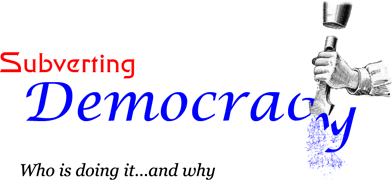 Democracy And Its Subversion
Democracy And Its Subversion
Democracy is an idea of how the people should govern themselves. It strives to enable every adult to have a say in the way that civil organizations are created and run.
As humans organized into clans, villages and cities it became necessary to create systems of accomplishing civil tasks, such as defense, provision of water, sewage and a host of other mundane but desirable tasks. Over time these jobs became institutionalized to the point that they functioned most of the time with little attention required by the citizenry. The compartmentalization of civil and governing functions removed these tasks from frequent scrutiny by the public and most of the time this worked well. However, there are people responsible for these institutions and they make errors of judgment and succumb to various temptations that lessen their performance for the public good.
It is the responsibility of the citizens in a democracy to stay informed and make changes and adjustments for the common good. The free flow of information and the transparency of civil institutions are necessary for decisions made by the voters which benefit the country as a whole. Of course, few decisions are unanimous, yet there is an implied contract that in a democracy where each adult gets a vote we will abide by the decision.
There arise vested interests that are lucrative or advantageous for some and for good reason they are reluctant to accept changes that erode that advantage. They hide the machinations that yield them the advantage and some even pay favors to those entrusted with setting or enforcing the laws. This is one of the greatest threats to a democracy, a subterfuge that produces and maintains a privileged group.
Once established, such a group is difficult to police and adjudicate since great sums of money are usually available to "convince" elected officials to make legislation favorable to their interests. This perverts the notion of hard or intelligent work to create wealth into a system of wealth protecting wealth. Typical battlegrounds are those populated on one side by the so-called "free market capitalists" and on the other side by conservationists, clean air advocates and open elections proponents. The one-person one-vote ideal begins to flag.
Vast sums are spent on preserving privileges certain industries have secured. Coal, oil, mining and securities and finance are the most visible which enjoy considerable freedom in the conduct of business pursuits. It is true that today there are more regulations for these industries than ever before, yet they remain extremely profitable, due, in part to antiquated and generous laws such as the General Mining Act of 1872 and the aging language of various securities acts. There has always been a hint of fear that if these enterprises suffered from over-regulation the country would experience high prices and unemployment. Judging from the hundreds of billions of dollars of profit the energy sector generates we can safely say that fear is absolutely unfounded.
The fines for misdeeds in these industries are miniscule when compared to the profit to be gained by ignoring or fighting the laws. The money spent to elect industry friendly politicians and produce business friendly "white papers" is enormous. If an industry can convince voters through slickly produced advertising that they are on top of safety, pollution and environmental concerns, well then, money has just been used to subvert the democratic process. The subversion continues through secret funding of policy think tanks that toe the line for the owners of such industries and it clandestinely flows into the public election process pushing industry chosen candidates to the front of the line.
This is why those who subvert democracy are arguably the greatest threat our country faces. It is likely a larger menace than the so-called Islamic State or Russia and it is in process now as it has been for over a decade.
